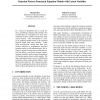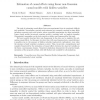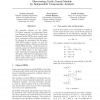116
click to vote
JMLR
2010
14 years 8 months ago
2010
Analysis of causal effects between continuous-valued variables typically uses either autoregressive models or structural equation models with instantaneous effects. Estimation of ...
145
click to vote
CORR
2010
Springer
15 years 9 days ago
2010
Springer
In a variety of disciplines such as social sciences, psychology, medicine and economics, the recorded data are considered to be noisy measurements of latent variables connected by...
126
click to vote
IJAR
2008
15 years 2 months ago
2008
The task of estimating causal effects from non-experimental data is notoriously difficult and unreliable. Nevertheless, precisely such estimates are commonly required in many fiel...
114
click to vote
CORR
2006
Springer
15 years 2 months ago
2006
Springer
The estimation of linear causal models (also known as structural equation models) from data is a well-known problem which has received much attention in the past. Most previous wo...
104
Voted
ICANN
2010
Springer
15 years 3 months ago
2010
Springer
Structural equation models have been widely used to study causal relationships between continuous variables. Recently, a non-Gaussian method called LiNGAM was proposed to discover ...
113
click to vote
ICA
2010
Springer
15 years 3 months ago
2010
Springer
Abstract. We discuss causal structure learning based on linear structural equation models. Conventional learning methods most often assume Gaussianity and create many indistinguish...
129
click to vote
UAI
2008
15 years 3 months ago
2008
We generalize Shimizu et al's (2006) ICA-based approach for discovering linear non-Gaussian acyclic (LiNGAM) Structural Equation Models (SEMs) from causally sufficient, conti...



